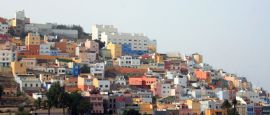Gran Canaria History, Language and Culture
History of Gran Canaria
Prior to the conquest of Gran Canaria by the Crown of Castille – a medieval state in the Iberian Peninsula – the island was populated by an indigenous people related to North African Berbers. Living in caves excavated from cliffs, the native Canarios had a sophisticated social hierarchy topped by two leaders who each ruled a kingdom. Many locals view the Canarios, who were decimated under early Castilian rule, as their heroic ancestors.
With the Canarios conquered, the island was planted with sugar cane, a valuable commodity that brought great wealth to Gran Canaria for more than century, until it was usurped by cheaper production in the Antilles. A long period of economic depression ensued until the mid-19th century when steam ships began arriving from Britain with well-heeled Victorians looking to winter in warmer climes. In 1881, Las Palmas developed its port and thanks mainly to those British visitors it soon became the busiest in the Canary Islands.
In 1821 when Tenerife was declared capital of the Canary Islands, it began to use its position to channel funding from the Spanish government into its own projects, at the expense of Gran Canaria. This led to a rift between the two islands, now best seen in rival beers and football teams. It wasn't until 1927 that Gran Canaria finally won her hard-earned billing as joint capital of the Canaries.
Mass tourism began in earnest in the 1960s when the superior beaches of Gran Canaria attracted bohemians to the Maspalomas dunes. Resorts responded with the construction of grand hotels and tourism has been the mainstay of the island's economy ever since.
Did you know?
• The Canary Islands boast their own sport, Canarian wrestling, which takes place at festivals. It's thought to be one of the oldest recognisable forms of wrestling.
• Despite its name, Gran Canaria is the third largest of the islands after Tenerife and Fuerteventura.
• Franco was military commander of the Canaries when the Spanish Civil War started in 1936; the plan to keep him out of the way by stationing him there didn't exactly work out – he went on to rule Spain for nearly 40 years.




 You know where
You know where